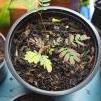-
Posts
1,574 -
Joined
-
Last visited
-
Days Won
75
Contact Methods
-
Website URL
http://
-
ICQ
0
Profile Information
-
Gender
Male
-
Country
Aus
Previous Fields
-
Climate or location
Temperate Tablelands
Recent Profile Visitors
11,639 profile views
Alchemica's Achievements
Newbie (1/14)
-
Rare
-
Rare
-
Rare
Recent Badges
-
Keen to hear people list off dietary/nutritional interventions they've found benefit from for mental or cognitive health. Trying to write up a more comprehensive list than what I can currently find elsewhere, early days let me know if you think of other additions https://1drv.ms/x/s!AiE8pZSRNVehlH63pwhJE5ags31C?e=y8b8zy
-
Found this to be a good review. Not suggesting self-medication using plants as a standalone to replace conventional pharmacotherapy but particularly think it may have some merits as adjunctive treatment, particularly if one sticks with more benign phytochemicals in line with more dietary-type modifications etc Alternative Therapy of Psychosis: Potential Phytochemicals and Drug Targets in the Management of Schizophrenia https://doi.org/10.3389/fphar.2022.895668 Anti-schizophrenic drugs have variable efficacy in different patients, with often poor efficacy and sometimes with debilitating side-effects. There is a great need of more efficacious and safer remedies. Phytochemicals offer potential and diverse alternatives to allopathic anti schizophrenic medicines due to their wide array of biological activities such as anti-inflammatory activity, anti-oxidant potential, affecting neurotransmission, and modulating cell signaling pathways Possible factors? - genetic and environmental factors, prenatal infections - neurochemical factors (dopamine, gamma-aminobutyric acid (GABA) and glutamate, serotonin and noradrenaline - interplay of neuro inflammation, oxidative stress, cell signaling pathways and abnormal immune system activation Phytochemicals playing a beneficial role? - Phytochemicals showing efficacy against schizophrenia belong to different phytochemical classes such as alkaloids, tannins, glycosides, phenolic acids, flavonoids, terpenes, terpenoids and essential oils.
-

Options For Mood Stabilzer
Alchemica replied to Ishmael Fleishman's topic in Pharmacology, Chemistry & Medicine
Best talking with your Dr but as an adjunct, not to be considered medical advice: Omega-3's seem pretty mood stabilising in most studies "sources state that omega-3s may have a mood stabilising effect and help with short-term symptoms of bipolar disorder" Dietary ketosis seems very stabilising, maybe could add some MCTs to your diet if you can't go full keto Lithium is natural, while high doses are only good suggested under medical supervision, some people find low dose lithium orotate can have some benefits N-acetyl-cysteine seems to have some 'leveling effects' and evidence for it's use in diverse mental health conditions 5-HTP or tryptophan might level out some emotional volatility If it's anxious distress, maybe something like oral lavender oil capsules you can get at the chemist which has similar levels of effect size on such as SSRIs and BZDs I found L-tetrahydropalmatine leveling Something like theanine? Taurine, Glutamine etc. Calming herbs. Whole range of more calming things out there that might dampen excitatory neurotransmission a bit for you Considered something like inositol? You need quite high doses and the level of evidence as a mood stabiliser isn't great but it's benign -

Theobromine for ADHD and attention deficits?
Alchemica replied to Alchemica's topic in Pharmacology, Chemistry & Medicine
They "... interact with all the base pairs of DNA (A-T; G-C) and phosphate group through hydrogen bond (H-bond) interaction." Probably similar to things like beta-carbolines that interact in the way below. Other ones like coralyne and berberine also form a complex with DNA, probably by intercalation, giving rise to therapeutic effects in things like cancer. Johnson, I.M., Prakash, H., Prathiba, J., Raghunathan, R., Malathi, R. Spectral analysis of naturally occurring methylxanthines (theophylline, theobromine and caffeine) binding with DNA. PLoS One 2012, 7, e50019. https://doi.org/10.1371/journal.pone.0050019 -
Anyone used theobromine for a sustained period and found it useful for attention deficits? The cacao flavonols would likely be synergistic over theobromine alone It's only an animal model study so far but potentially an option Theobromine improves hyperactivity, inattention, and working memory via modulation of dopaminergic neural function in the frontal cortex of spontaneously hypertensive rats https://doi.org/10.1039/D4FO00683F While it has a nonselective PDE inhibition effect greater than caffeine, oral theobromine inhibits mTOR signalling in vivo which is of relevance to multiple conditions [1] and elevates cerebral brain-derived neurotrophic factor and facilitates learning in animal models [2] and orally supplemented, it upregulates the pathways in the mPFC, which may then improve working memory in animal models [3]. MTXs act through a variety of different molecular mechanisms: mobilization of intracellular calcium, inhibition of phosphodiesterases (PDEs), modulation of gamma-amino butyric acid (GABAA) receptors, inhibition of high affinity ATP-dependent cyclic nucleotide transporters and antagonism of adenosine receptors. The plasma levels that could be reached under dietary regimes and the fact that MTXs readily cross the blood-brain barrier indicate that these drugs inhibit adenosine receptors in the CNS; higher doses may be required to mobilize intracellular calcium, inhibit PDEs or modulate GABAA receptors, or to unselectively inhibit ABCC5 and ABCC4 transporters. Moreover, despite the physiological relevance, also under scrutiny is how caffeine, theobromine and theophylline are able to interact with native double helical DNA [1] https://www.ncbi.nlm.nih.gov/pubmed/30451374 [2] https://www.ncbi.nlm.nih.gov/pubmed/27833051 [3] https://www.ncbi.nlm.nih.gov/pubmed/31010016
-
Theres Aus shops like this Home - My Terpenes Australia For pinenes, I tend to use frankincence essential oil unless you can get the pure terpene - ~30-60% α-pinene. There seems to be different enantiomers in different oils which needs to be taken into account. Even between B. carterii and B. sacra there seems to be different pinene enantiomers. α-pinene: anti-inflammatory via PGE1, acetylcholinesterase inhibitor - aiding memory, positive modulator of GABAA receptors at BZD sites. α-pinene was observed to initiate soothing physiological and behavioural responses with a significant impact on physiological and psychological relaxation. (1R)-(+)-α-pinene was more prevalent than (1S)-(−)-α-pinene in pine oils (+)-α-Pinene was the predominant enantiomer in most rosemary, this is intriguing as (-)-α-pinene displays partial modulation of GABAA-BZD receptors and direct binding to the BZD binding site of GABAA receptor while the (+)- enantiomer is less characterised. α-Pinene shows anti-metastatic and anti-tumor activities. Moreover, it seems to be anti-inflammatory, anti-oxidant and an anti-allergic bronchodilator and can produce anxiolytic and hypnotic effects via the GABAergic system (α-PN shows anxiolytic and hypnotic effects upon inhaled administration. α-PN evokes its hypnotic action through direct binding to GABAA as a partial modulator at the benzodiazepine binding site
-
I've played around a bit with terpenes/Citrus oils, even making a transdermal spray. I find they get more interesting as synergistic blends. Komiya and colleagues (2006) observed that lemon oil vapor inhalation causes an anti-stress effect by modulating serotonergic and dopaminergic in addition to GABAergic systems in mice. Limonene enhances neurotransmitter release and could inhibit HPA activity under physical stress, It may act via regulating dopamine levels and 5-HT receptor function, along with GABAA activity. Citrus essential oils have been utilised widely in traditional medicine "Improvements in neuroendocrine, neurotrophic, and monoaminergic systems are related to the antidepressant effects of limonene". It produces antidepressant-like effects that seems to be mediated by 5-HT and dopamine neurotransmission and is an agonist for adenosine A(2A) receptors. Lemon essential oils showed strong ability to improve memory in animal models It is suggested "metabolites of these monoterpene compounds contained in citrus essential oils have a stronger effect on monoamine release from brain tissue than the monoterpene compounds themselves"
-
No experience with consumption myself either but maybe I need to expel some bad spirits....
-
Doing lots of cuttings of this at the moment, if someone wants to grow it get in touch here. No WA/TAS. Tea has been prepared from the leaves, rich in antioxidants. Iresine herbstii (Amaranthaceae), traditionally called “cimora se˜ norita”, is used in black magic (De Feo, 2003) and in association with San Pedro for magic rituals (Friedberg, 1959; Dobkin De Rios, 1977; De Feo, 2003), to diagnose illness, and to take possession of another identity (Cruz-Sanchez, 1948). Its leaves are claimed, for external use, a skin depurative, whereas the aerial part decoction is known to be an antipyretic (De Feo, 2003). - anti-inflammatory, cytotoxic and apoptotic activities and antioxidant activity - affinity for the 5-HT1AR - affinity for 5-HT2C receptor and for D1 receptor (MeOH extract) - lower affinity for D1 and higher affinity for D2 receptors (Aq. extract) - presumable antagonist action on D1 and D2 receptors by Iresine (both extracts) Leaves: 2,5-Dimethoxy-6,7-(methylenedioxy)-isoflavone; acylated betacyanins Roots: oleanolic acid and its saponins. An alcoholic extract of the root showed the presence of amino acids, steroids, triterpenoids, alkaloids and coumarins. https://doi.org/10.1016/j.jep.2005.11.022 https://doi.org/10.1076/phbi.34.3.184.13212
-

Took Galantamine last night
Alchemica replied to Alchemist's topic in Pharmacology, Chemistry & Medicine
Galantamine is interesting as it functions as both an AChE inhibitor and positive allosteric modulator of a7-nAChRs, I found it quite cognitively interesting but wasn't looking for lucid dreams. On the contrary, huperzine A seems more to be AChE/NMDARs. Your DMAE dose seems personally quite low but I can see there being challenges using it with sleep as some people find it activating. As the bitartrate 250mg-500mg may be more typical, eq, dimethylaminoethanol freebase ~186mg at the upper dose. Out of interest, have you explored something like CDP-choline as a cholinergic? It seems to have procognitive effects mediated by predominately a7-nAChR activation. More recently there's been interest in coupling AChE inhibition with CDP-choline or alpha-GPC for dementias and that seems to be an effective augmentation, so perhaps that could be possible to cautiously augment huperzine A with such, in theory. I have some Silene undulata 98% triterpenoid saponins extract from the SAB store, if you want a bit in an envelope no cost send me a PM. It didn't get as frothy as expected (presumptive test for saponins) but did form a lasting sort of foam to some extent. -

psychotropic water kefir
Alchemica replied to withdrawl clinic's topic in Pharmacology, Chemistry & Medicine
There's been a bit of research into fermentation of different plants with either lactic acid bacteria or yeasts. I've tried to summarise a bit of it here The Science of Fermented Fruits, Veggies and Plant Medicines - Pharmacology, Chemistry & Medicine - The Corroboree (shaman-australis.com) The bacteria and yeasts are in a way potentially mildly psychoactive, hence their often-termed action as "psychobiotics". I've only tried milk kefir, which is interesting in it's own way, as the kefir peptides are too mildly psychoactive but you're right, fermenting a plant into the mix is an interesting concept and worth exploring more. There's the classic example of Sceletium which I've tried to explore here with yeasts yeasts to encourage bioconversion.pdf Let us know if you do any experimenting yeasts to encourage bioconversion.pdf -
Stuck with this for awhile and there's been the slow but gradual return of some seemingly simple cognitive functions when used catalytically with effort and attempting to retrain my mind. For example, I was unable to sit and watch something as simple as a short youtube clip and follow the video. I've lately got back into watching inspirational short videos that I'm enjoying and can now watch something like a 30min clip which was previously totally unfeasible. I've started to embrace the need to do a lot more simple cognitive remediation in my day, for example getting back into colouring in an adult colouring books etc as an activity It hasn't all been linear for recovering some levels of very basic functionality, the cognitive fatigue associated with essentially retraining and forging some new connections of some basic cognitive functions has been extreme and literally left me floored and sometimes come at the expense of maintaining functionality in other domains.
-

Coscinium fenestratum & Berberine
Alchemica replied to Ishmael Fleishman's topic in Pharmacology, Chemistry & Medicine
There seems to be several factors that limit berberine's bioavailability to the <1% mark: poor absorption extensive metabolism efflux back to the intestinal lumen by the action of permeability glycoprotein (P-glycoprotein, P-gp) As piperine from black pepper works on the cytochrome metabolism and P-gp level, it may very well be worth considering but haven't seen it done Things that have been studied are detailed here The Quest to Enhance the Efficacy of Berberine for Type-2 Diabetes and Associated Diseases: Physicochemical Modification Approaches the phospholipid-berberine complexes including things like encapsulating it in lecithin seem to have some significant effects on bioavailability in studies but wasn't able to personally tell how effective it was, lets just say I had lots of experiments happening. -

Coscinium fenestratum & Berberine
Alchemica replied to Ishmael Fleishman's topic in Pharmacology, Chemistry & Medicine
Thanks for the writeup. I explored a long time ago, also made up a mix of berberine hydrochloride with lecithin trying to improve it's bioavailability and was interested in it's CNS effects and beneficial metabolic effects, the CNS effects particularly related to it's sigma-1 agonism, prolyl oligopeptidase activity and monoaminergic effects Berberine may offer benefit in the control of psychotic and depressive symptoms, along with metabolic side effects. It has a broad range of CNS relevant pharmacological actions, including sigma-1 agonism, acetylcholinesterase inhibition and a range of neuroprotective effects including neurotrophin-mediated neuroprotection (NGF). There are some limitations to its use, including bioavailability and difficulties in reaching active levels in the CNS. “The potential use in schizophrenia was suggested when berberine was found to act as a D2-receptor antagonist, although it was also noted that dopamine level was increased in the brain as partly responsible for its antidepressant mechanism. It is unclear if these influences on dopamine level and action may counter each other, diminishing the proposed antipsychotic effect. Future studies may also elucidate whether berberine will exacerbate extrapyramidal motor symptoms due to the blockade of D2 receptors. On the other hand, it was proposed that the anxiolytic effect of berberine resulted from its antagonism at 5-HT2 receptor. This finding may indicate less severe motor side effects, if there are any, when berberine is used as an antipsychotic since atypical antipsychotics also act via 5-HT2 receptor blockade. A possible advantage of berberine over other antipsychotics is its ability to inhibit prolyl oligopeptidases, the activity of which is elevated in psychosis and not targeted by antipsychotics at present.” -
I'm just using a likely high asarone Acorus calamus essential oil. I don't want to make it a long-term addition but something to get out of a rut. Early days but small subjectively useful shifts, combined with little lifestyle shifts when I can seem to help slightly. I get very rigid in my routines and behaviours, so if this is a way to potentially plasticise my mind and behavioural repertoire a bit that could be good That could be useful and possibly minimise toxicity? I know some people simply chew the calamus rhizome, that seems to be the suggested way to use the Japanese Sweet Flag SAB sells for stimulant effects. This intranasal spray is a bit more full on with quite significant levels of asarone which I think would be hard to reach via plain herb Yeah that one's Acorus gramineus, it's got a diverse range of constituents that have interesting pharmacology aside from asarones. Still, whilst it seems to have quite prominent TCM use etc, I'd probably stick with chewing it etc as you mention My notes on A. gramineus

















